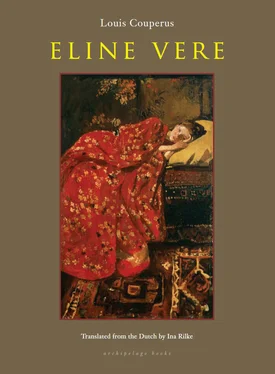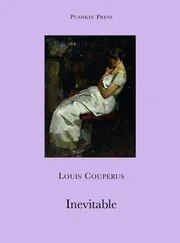‘What is the matter with me?’ she asked herself in despair. ‘Why can I remember nothing of hundreds of things that have happened, except that I know that they happened? Oh, the dullness in my head! I’d rather be in terrible pain than suffer this dullness! I must be going mad. .’
A shudder ran down her spine like a cold snake. Suppose she did go mad, what would they do with her? It did not bear thinking about, and yet, even as she struggled to banish the spectre of encroaching insanity, she had a sense of crossing a forbidden limit. Because if that was what she was doing then she must be. . losing her mind!
At such moments she would cover her eyes and her ears with her hands to block out all sight and sound, as though the first impression she might now receive would push her over the brink into madness. So terrified was she of this happening that she did not breathe a word to Reijer about the befuddlement in her brain.
During her prolonged spells of inactivity she became enslaved by strange fantasies and delusions, often rising to a bizarre strain of ecstasy, from which she would suddenly start awake in shock. Reclining on her couch, nervously toying with the tassels on the cushions or twisting a strand of her long, tousled hair, she mused on the theatrical illusions she had cherished in the old days of her duets with Paul, when she thought she loved Fabrice. Then she became an actress, she was on stage, she could see the audience, she smiled and bowed, it rained flowers. .
She rose to her feet in a daze, and began to hum some recitative, or a few phrases from an Italian aria as she drifted about the room, throwing up her hands in despair, reaching out beseechingly to a fleeing lover, falling down on her knees and begging for mercy even as she was being forcibly dragged away. . Diverse roles floated into her mind: Marguerite, Juliette, Lucie, Isabelle, Mireille, and in her transport of excitement she became all these heroines, acting out their most tragic moments in swift succession, only to wake abruptly from her delirium to find herself all alone in her room, making strange gesticulations.
Coming to herself again, she thought:
‘Oh God! Is it true? Am I going mad?’
She sank on to the couch again and kept very still, wide-eyed with fear, as though some horrible catastrophe were about to strike, as though the faces in the paintings and prints on the walls had suddenly come alive, jeering at her and grimacing like demons.
After such a day she would resolve, in quiet dread, to take possession of herself. The following morning, upon waking from her leaden, artificial slumber, she rose promptly from her bed and dressed with care, after which she went out to make some purchase, take coffee with Henk and Betsy, or call on either the Verstraetens or Madame van Raat. She said she was lonely, and people invited her to dinner now and then out of pity. On such occasions the evening passed quite cheerfully, and she returned to her rooms afterwards glad to have reached the end of another day, but almost fainting with exhaustion from her unwonted animation, her forced brightness, her unnatural, shrill laugh, not to mention her endless coughing. And she would pay heavily at night: the drops had no effect; she remained wide, wide awake, prey to the wildest phantasms conjured by her sick mind as she relived the day’s strenuous activities.
She was the subject of much talk, and Betsy frequently remarked with a worried frown that she feared Eline was ill; she was acting so strangely these days, and Reijer was not at all satisfied either. And everyone felt sorry for her: poor, poor Eline, who used to be so elegant and alluring, so gay! Now she was like a shadow of her former self on the rare occasions that she was seen venturing out in the street with nervous, unsteady gait, her muff pressed to her lips, and there was something almost timid in the way she tilted her head in greeting the Van Larens, the Hijdrechts, the Oudendijks. No indeed, she was not at all well; it was evident for all to see.
. .
It was raining: a cold, driving March rain, and Betsy was at home, sitting in the violet anteroom by the conservatory with her armchair pushed into the light so that she could read her book, Pêcheur d’Islande by Pierre Loti. But the story bored her: she could not imagine fishermen being quite so sentimental. Beyond the potted palms in the conservatory she could see into the garden, where the bare trees glistened starkly in the downpour. Ben sat on the floor by his mother, his head lolling against her skirts, his eyes fixed on the leafless branch of an elm tree tossing madly in the wind and rain. He heaved a sigh.
‘What’s the matter Ben, is anything wrong?’ asked Betsy.
‘No, Ma,’ he said in his slurred voice, looking up at her in wonder.
‘Then why did you sigh, darling?’
‘Don’t know, Ma.’
She looked at him intently a moment, then laid aside her book.
‘Come here, Ben.’
‘Where, Mama?’
‘Here, on my knee.’
Smiling, he clambered onto her lap. Her tone, formerly sharp when addressing her only child, had softened of late.
‘Do you love your mama?’ she asked fondly.
‘Yes.’
‘Give me a hug, then.’
He threw his short arms about her neck.
‘And now give me a kiss.’
Beaming doltishly, he kissed her.
‘Mama is never bad, is she?’ asked Betsy.
‘No.’
‘Do you like sitting on Mama’s lap?’
‘Yes.’
The overgrown seven-year-old snuggled up against her bosom.
‘Tell me, Ben, is there anything you’d like to have? Shall Mama give you something nice?’
‘No, thank you.’
‘Not even a cart, for instance, with a pony, a proper pony? Then Herman could teach you to drive.’
‘No, thank you,’ he said blankly.
She grew impatient, and was on the point of scolding him for being so witless, but stopped herself just in time. She held him close and kissed him.
‘Well, if there’s anything else you want to have, you must tell me, do you hear?’ she resumed, almost in tears. ‘You’ll tell me, won’t you, Ben? What do you say, little man? Promise you’ll tell Mama?’
‘Yes,’ he replied in a tone of blissful contentment.
And she shut her eyes, shuddering at the thought that she had an idiot son. What had she ever done to deserve such a punishment?
She sat there holding her child on her lap for some time, when she heard someone approaching through the salon. It was Eline.
‘Well hello, Elly.’
‘Hello, Betsy. Hello, Ben.’
‘So you went out in spite of the rain?’
‘I took a cab; I couldn’t stay indoors a moment longer. This weather makes me so dreary, and I thought. . I thought I was going mad with boredom. Oh, God!’
With a strangled cry she dropped into a chair and tore off her short veil, as if she needed air.
‘Just imagine: the same four walls of your room day in day out, all by yourself, with nothing to distract you — surely that would drive anyone mad? Anyway, I can’t stand it any more; if it goes on much longer I’ll go insane. .’
‘Eline, prends garde: l’enfant t’écoute.’
‘Oh, him. . he doesn’t understand, and I don’t think he ever will!’ she ranted hoarsely. ‘Come over here, Ben, and listen to me. Shall I tell you what to do when you grow up? Never think about anything, poppet! Don’t think at all! Just eat, drink and have fun for as long as you can, and then. . then you must marry! But don’t start thinking, whatever you do!’
‘Eline, vraiment tu es folle! Mind what you’re saying!’ Betsy burst out, more concerned for her child than for her sister.
Eline laughed out loud; the shrill, crazed edge to her voice frightened Ben, who gazed up at her round-eyed, his mouth gaping. But she went on laughing.
Читать дальше












